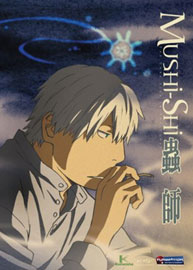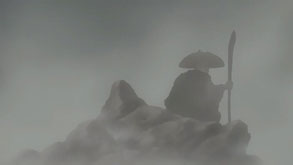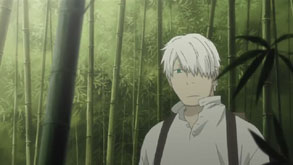|
|
Anyone who's read my reviews of Mushishi vol 1 and Mushishi vol 2 will know how highly I've rated the series so far, and with the third volume it continues to impress. Once more the story follows Ginko, a wandering 'Mushishi' who helps people afflicted by Mushi. Mushi are strange lifeforms that are invisible to most people, but the strange effects they cause can have a direct - and often unusual - impact on humans. Each episode so far has been a perfectly formed story which
sees Ginko encounter a new Mushi, but so far we haven't met any other Mushishi...until
now. Mujika is a Mushishi that has stayed in one place, living on a
mountain and acting as a focal point for the life stream that flows through it.
He is essential to the mountain and the nearby villages, but there is more to
his story than meets the eye. Meanwhile we also get the opportunity to
look into the past as a young orphan boy is rescued from a landslide by a
one-eyed, silver-haired Mushishi called Nui. Nui lives near a lake
inhabited by Tokoyami, a dangerous Mushi that can cause people to forget
everything and disappear into eternal darkness. Another Mushi appears to
live with the Tokoyami, emitting light that turns the fish in the pond white and
takes one of their eyes. Nui calls this Mushi Ginko, and knows that it has
the same effect on people that are exposed to it for too long, so she wants the
boy to leave as soon as possible. However, there is another reason she
wants him to go, and his decision could potentially change his life forever.
We also see Ginko come to a town where a young girl who fell from a dangerous
bridge into a deep ravine emerged unharmed, but seems to be in a trance.
She no longer speaks or reacts to people, and her family in desperation has
called on Ginko's services to try and snap her out of it. In the final
episode on the disc he comes to a bamboo forest where he meets a man who is
trapped and cannot leave. When with him Ginko also becomes trapped, but as
soon as the man leaves him Ginko is able to leave the forest. Intrigued by
the man's plight Ginko goes back to the forest to try and find the cause of the
problem, but the answer is stranger than he could know. |
|
The main problem with Mushishi so far is that it's causing me to run out of superlatives to describe it with. Once again the series is absolutely superb, drawing you into a deep and intriguing world and evoking a feeling of folk tales and fables. Each Mushi is so inventive and their effects are intriguing, but what the series does well is relate them to human characters and the natural world. The stories are constructed in such a way that they seem pretty believable, and the human reaction to the effects Mushi cause are also |
|
|
perfectly done. Each episode feels like an old legend, whether the 'one night bridge' that appears once every 80 years or so above a deep ravine, taking the lives of nearby people and animals, or the Tokoyami, which takes all light and causes you to disappear from this world if you forget your name. They feel like cautionary tales from the past, folk tales that intrigue and frighten in equal measure. As I have said before, each episode is like a mini film,
there's so much squeezed in that it feels like more than just 25 minutes has
gone past by the end of each one. Each story is so involved, each
character so believably fleshed out and each Mushi so interesting that the lack
of any overarching story doesn't matter. What's even more remarkable is
that, half way through the series, Mushishi is still managing to create
such original and involving stories. The format hasn't become stale and
the series still succeeds in bringing a level of emotional involvement to each
story that most series fail to achieve in their entire run. Despite the
fantastical effects of the Mushi, there is a human focus that grounds the series
with a sense of reality. |
|
|
What is great about this volume is that you get to see other Mushishi. It's interesting to see Ginko interacting with peers instead of those who don't know much about Mushi, and it brings a different dynamic to the story. Mujika is an old man, he has lived a different life than Ginko but started out in much the same way. Through him Ginko can see what his future could be, and the interactions between the two are superb. Mujika is also training an apprentice, a young boy who can see Mushi and has received a basic level of Mushishi |
|
training. This brings another aspect to the story, as it allows Ginko to speak to him without explaining everything. However, for me the highlight of the disc was episode 12, where we get a glimpse into the past and meet the Mushishi Nui. Nui is a lot lot Ginko, and she shapes his character as well as providing an explanation for why Ginko has one eye and white hair. The Tokoyami and Ginko are amongst the more disturbing and interesting Mushi so far encountered, and the episode gives another potential future for our hero. In comparison the other two episodes are very, very good but tread more familiar ground. Episode 13 is where Ginko examines the girl who fell into the ravine, whereas episode 14 sees him attempt to help the man stuck in the bamboo forest. Both are superb stories in their own right, and have some intriguing concepts in them, but aren't quite in the same league as the first two episodes on the disc. However, overall Mushishi vol 3 is still another awesome instalment in one of the best anime series I've ever seen. The animation, art and music is stunning and each story is superb. Few series manage to capture a cinematic feel or develop emotional involvement with its characters, but Mushishi does both. If you haven't seen it yet then you are really missing out. Extras: Once again we get the clean opening and ending sequences and trailers, but the highlights are more lengthy interviews. This time we get the director in discussion with the sound director again, and a 20+ minute discussion between the directors and technical advisor. Both interviews give a great insight into the Japanese creative process, and make a great selection of extras. Ratings Feature:
|









